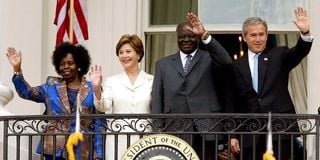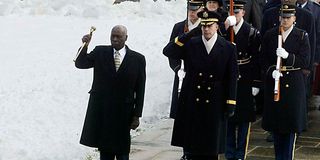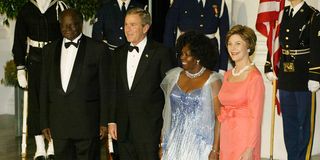Premium
What happened during Moi and Kibaki's State Visits to the US

In this file picture, then US President George Bush (right), Kenyan President Mwai Kibaki (second right), Kenyan First Lady Lucy Kibaki (left) and US First Lady Laura Bush wave from the balcony of the White on October 6, 2003.
What you need to know:
- Daniel arap Moi made a State Visit to the US between February 19–22, 1980.
- Mwai Kibaki made a State Visit to the US between October 5–7, 2003.
Kenyan Presidents have toured Washington over the years, signaling closer ties between the US and Kenya.
According to historical records, only Jomo Kenyatta never made such a trip.
President William Ruto's predecessors - Daniel arap Moi, Mwai Kibaki and Uhuru Kenyatta - all met with US Presidents at the White House during their respective tenures, although these trips were under different circumstances.
Here is what happened on two previous State Visits to the US by Kenyan presidents:
Daniel arap Moi: February 19–22, 1980
During this visit, President Moi met with his host President Jimmy Carter for one hour and 15 minutes in the Cabinet Room of the White House on February 20, 1980.
They met again for dinner that evening. The hottest issues at the time were the civil war in Uganda and the independence struggle in Zimbabwe.
The Soviet Union had just invaded Afghanistan and the US was lobbying its allies to boycott the Olympic Games in Moscow that year.
Kenya heeded the call and boycotted the games.
Iran was also having a spat with the US over American diplomats who had been hostage for nearly two years.

In this file picture, President Daniel arap Moi salutes at the Tomb of the Unknowns in Arlington National Cemetery in Arlington, Virginia on December 6, 2002.
President Moi had promised to help negotiate. However, it is Algeria that finally mediated the hostage crisis that helped free the 52 American hostages on January 20, 1981.
They had been seized from the US Embassy in Tehran in November 1979.
Today, Moscow is still subject of lobbying for isolation, just as Tehran was back then.
The United States is also still providing crucial assistance for security and social services.
But the circumstances have changed with the nature of tensions involving the US and Russia focused on Ukraine and competition in Africa.
Mwai Kibaki: October 5–7, 2003
President George W Bush welcomed President Kibaki at the White House with a mind of rallying allies against terror merchants.
It was President Bush’s first hosting of a State Visit since taking power in 2002 but Washington was also just smarting from the 9/11 terror attack masterminded by Al-Qaeda, then led by Osama bin Laden.
Bush himself had launched wars on Afghanistan, which at the time was said to be a State sponsor of terrorism, and Iraq under Saddam Hussein whom the US blamed, inaccurately, of making weapons of mass destruction.

In this file picture, then US President George Bush (second left), Kenyan President Mwai Kibaki (left), Kenyan First Lady Lucy Kibaki (second right) and US First Lady Laura Bush at the North Portico of the White House in Washington DC on October 6, 2003.
But President Kibaki was in Washington to seek support to patch up a tattered economy he had inherited from years of misrule by Moi.
President Kibaki did admit terrorists were a “global threat” just as Washington offered an initial $100 million to help boost Kenya's security operations.
After the meeting, the IMF and the World Bank, which had in 2001 suspended lending to Kenya over corruption, agreed to loosen their purse strings.
But Kibaki turned out to be a shrewd borrower, avoiding the two lenders most of the time during his tenure.





